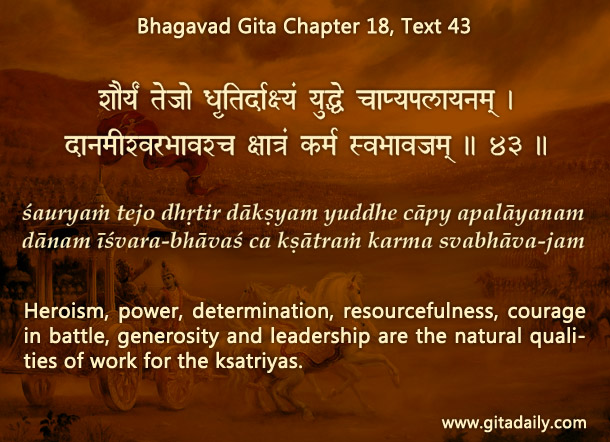When Krishna describes the virtues and duties of various social classes in the Bhagavad-gita (18.41-44), he mentions a specific virtue that characterizes brahmanas: forgiving (18.42), which implies not fighting. Yet in the very next verse (18.43), he mentions an opposite virtue as a kshatriya characteristic: fighting without flinching. Why this sharp contrast?
Because Arjuna had been prioritizing the brahmana virtue over the kshatriya virtue that he needed for discharging his social responsibility. At the start of the Bhagavad-gita, Arjuna was inclined to call off the war by simply forgiving the Kauravas for their many wrongs.
Forgiveness is a vital, even essential, virtue at a personal level. We all can strive to act like brahmanas and forgive each other for the minor mistakes that we are prone to commit amid life’s pressures. Still, forgiveness can’t be the default state policy; the state cannot simply forgive people who have committed wrongs that are serious enough to be legally punishable crimes. If a state starts forgiving everyone, crime will soon skyrocket and the state won’t remain a state — it will become a jungle.
The Kauravas led by Duryodhana were repeat offenders who had done several heinous crimes, many of which merited capital punishment. And Duryodhana had shown no sign of even regret, leave alone reform. Forgiving him and letting him stay in power would be a disastrous dereliction of duty on Arjuna’s part.
Kshatriyas take up the responsibility of maintaining social order, which sometimes necessitates not flinching when confronting wrongdoers. Unfortunately, Arjuna was doing exactly that: flinching in the face of a necessary duty and mistaking his sentimental weakness to be compassionate forgiveness.
To highlight Arjuna’s error of judgment, Krishna contrasts the virtues of the two social classes.
One-sentence summary:
By contrasting the virtues characteristic of brahmanas and kshatriyas, Krishna urges Arjuna to unflinchingly punish the Kauravas, not sentimentally forgive them.
Think it over:
- Why is forgiveness desirable as a personal virtue?
- Why is forgiveness undesirable as a state policy?
- Why does Krishna present contrasting brahmana and kshatriya virtues in successive verses?
***
18.43: Heroism, power, determination, resourcefulness, courage in battle, generosity and leadership are the natural qualities of work for the kshatriyas.
To know more about this verse, please click on the image


Leave A Comment